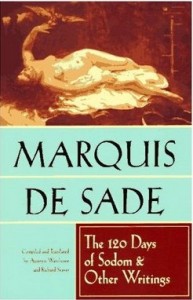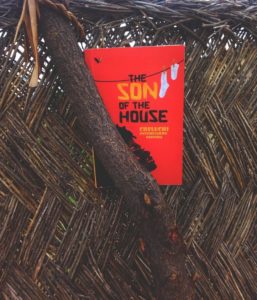“If the book does not shake us awake like a blow to the skull, why bother reading it in the first place?” — Franz Kafka
I may have followed Kafka’s exhortation beyond its illogical extreme when I opened Marquis de Sade’s 120 Days of Sodom, an exhaustive index of sexual excesses in their most revolting form. 4 aristocrats, 46 sex slaves, 4 prostitutes, and 120 days in a heavily guarded castle tucked far far way from the “just” world of society.
120 Days is a cross between a fairytale and the Arabian nights though turned inside out. There is a Duke, a Bishop, a castle, and damsels. The 4 prostitutes have the task of weaving the numerous acts of sexual abuse and savage killings into stories. But the stories end up being told and retold, stringed and framed, appear and die off, begin again and break off.
Sade warns, “I advice the overmodest to lay my book aside at once if he would not be scandalized.” What he is not saying is that 120 Days is light reading for no one, not even for the radically immodest. Even the ancient city of Sodom will blush at reading the book.
“The Bastille was a desert.” — G. Battaile
Sade wrote 120 Days of Sodom while Sade was confined in the infamous Bastille. In many ways, the book bears the marks of confinement.
What is Sade trying to do?
If eroticism is the threshold where violence meets sexuality, Sade wants, it seems, to communicate what life in this threshold would be like, a threshold where sex is equivalent to mass murder, rape, and incest. A world where the only currency–the only thing exchanged or circulated–are mutilated and disfigured bodies? 120 Days is not a novel. There are no characters. There are only bodies memorable because of their deformities and for their capacity to be killed. For Sade, eroticism is a kind of sexual state of exception and 120 Days is a manual on how to live constantly in this state of exception. Not even Sade, despite the libertine that he was, could have been able to live out the extreme violence imagined in the book.
Is it madness that drove Sade to write a book like this? Is it solitude?
Since madness is a kind of solitude, which is also a kind of madness, it is hard to say. It’s funny though because the erotic is always a private experience sought for in secret places far from the social world of convention. Like madness, eroticism is also silent. Eroticism flowers where, as with madness, desire exceeds the boundaries of the law. My guess is that only madness could take Sade to the solitary places of the heart where eroticism could unite with the most extreme form of violence and death.
“His writing was the outlet for his passions and in it he pushed back the limits of what was possible beyond the craziest dreams ever framed by man.”—G. Battaille
Should we burn 120 Days of Sodom? No.
Photo Credit: Sociopath (Album cover)











Black pinstripe suit August 27, 2011 06:40
Allison Virgin